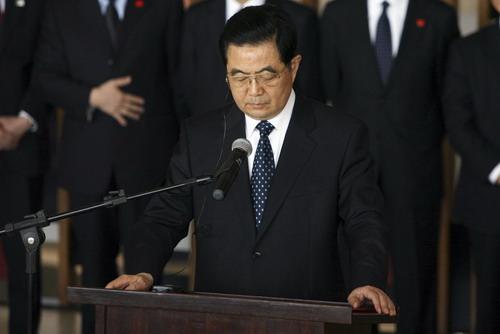BRASILIA - Chinese President Hu Jintao on Thursday urged closer cooperation among the BRIC nations (Brazil, Russia, India and China), saying that China is ready to host the third BRIC summit to maintain and advance dialogue and cooperation.
 China's President Hu Jintao speaks during a signing ceremony at the Itamaraty Palace in Brasilia April 15, 2010. [Agencies]
China's President Hu Jintao speaks during a signing ceremony at the Itamaraty Palace in Brasilia April 15, 2010. [Agencies]"BRIC cooperation now faces both valuable opportunities and severe challenges. We should set clear objectives for cooperation among the four countries and advance the BRIC cooperation process from a strategic height," said Hu in a speech to the second-ever BRIC summit here.
The world's leading emerging powers gathered last June in Russia's Yekaterinburg for the first BRIC summit.
He said BRIC nations should "base our cooperation on political mutual trust, and treat each other with sincerity, mutual respect, mutual understanding and mutual support."
"We should focus on practical cooperation and make our cooperation more dynamic through concrete actions. We should strengthen institutional building to support increased cooperation in broader areas. We should aim for mutual benefit by combining our respective strengths and sharing the fruits of cooperation to the fullest extent."
He also said BRIC nations should "view openness and transparency as the prerequisite of our cooperation and strengthen communication and exchanges to make our cooperation an open process."
The Chinese president said the international situation is now "very complex," and that the global pattern is undergoing "profound readjustment."
"No matter how the international situation may evolve and what changes the international system may experience, we should remain firmly committed to the goal of mutual benefit, the principle of democracy and equity, the approach of mutual respect and the spirit of solidarity and cooperation."
Hu called for all parties to "firm up the foundation of the world economic recovery and strengthen macroeconomic policy coordination."
"The international community coordinated the 'entry' strategy in response to the financial crisis, and we must also act in coordination with respect to the 'exit' strategy and maintain the continuity and stability of macroeconomic policies," he said.
He also called for all parties to address "imbalances in the global economic governance structure."
"It is important to achieve on schedule the quantified reform targets of international financial institutions set by the G20 Pittsburgh Summit and increase the representation and voice of emerging markets and developing countries," Hu said.
On trade liberalization and facilitation, Hu urged all parties to properly handle trade disputes and reject protectionism.
"The main parties to the Doha Round negotiations should demonstrate sincerity and flexibility to reach comprehensive and balanced outcomes at an early date and facilitate the establishment of an open and mutually-beneficial multilateral trade regime," he said.
On the improvement of the international financial supervisory and regulatory regime, Hu said it should expand its scope, specify responsibilities, adopt universally accepted standards and norms and strengthen mechanisms.
"There should be supervision over the macroeconomic policies of major reserve currency issuing economies and over sovereign credit rating agencies."
Hu urged all parties to "embrace a stronger sense of responsibility and morality and work for balanced global development."
"It is important to scale up input in development and ensure development resources and at the same time respect each other's development model chosen in the light of national conditions and policy space," he said.
On the High-Level Meeting on the Millennium Development Goals (MDGs) scheduled for the coming September by the United Nations, Hu said the international community, particular developed countries, should honor their commitments in increased assistance, debt relief, market access and technology transfer and help developing countries promote economic growth, improve people's well-being and meet the MDGs.
Hu left here on Thursday for home after attending the BRIC summit and paying a state visit to Brazil. He headed home earlier than originally scheduled because of a strong earthquake in northwestern China that has killed at least 760 people. He also postponed visits to Venezuela and Chile.
Before travelling to Brazil, the Chinese president attended the Nuclear Security Summit in Washington on April 12-13.





